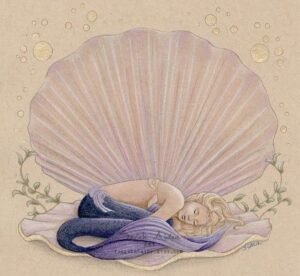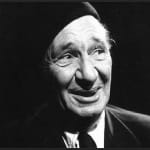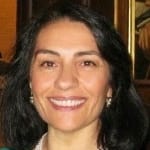TRANSLATED FROM THE TURKISH BY AYSEL K. BASCI

Image used for representation
“Be absolutely sure,” I said, “to come and wake me up before dawn. Do you see that island directly ahead? I keep dreaming about it. We must get there before dawn.”
“Okay” he said. “That one is called Mermaid Island. I will wake you up well before dawn.”
It had been years since I’d fished there. The last time I was there, I was already an old man. If I were to die and, just before my last breath, I were to recall the most important experiences of my life, those that left significant marks, the pleasant memories of fishing on the shores of that island would rank the highest, higher than any gratitude I may feel about material gains and achievements, and higher than the great losses I suffered materially or socially throughout my life. I will remember those gains and losses in life as small, vague dots, while I will cherish the memory of fishing on the shores of Mermaid Island as the brightest and most lively experiences of my life.
When my final day arrives, as twilight casts its shadow upon my eyes, those memories will no doubt serve as the last light I see, and the last happiness I feel.
As Eos, sister of the sun and Goddess of Dawn, rose above the horizon, she was suffused with a rose-colored light. The pink rays of her radiance were like fingers playing through the rows of horizontal clouds as if they were the strings of a harp. Light, pink and serene, spread across the sea and the sky. I asked Mehmet, who was rowing next to me, “Why do they call it Mermaid Island?”
He smiled. “Some people believe that in the moonlight the mermaids go there. I haven’t seen them, but a few times at night, when the island was under the moonlight, I heard them. They sounded as if they were feasting upon the sea. There were faint white bodies swimming on the surface of the waves. I will never forget their very odd, ringing laughter, and it gave me the creeps. To say that I was scared would be a lie, but to say I wasn’t would also be a lie. I remember having a strange urge to laugh. Then, I got scared of becoming captive to their spell and immediately grabbed the oars of my boat.”
“Why, do they cast spells on people?”
“My grandfather saw them. He was not one to care much about money or other worldly possessions. He ended up giving his heart to one of them, and then he became strange. My father used to look at this island from a distance and used to repeat what his father had told him. (Mehmet lit a cigarette. It was clear he wanted to talk. He had a reassuring voice.)
“My father used to tell me about it. There was not a single cove or bay in these Sporad Islands where my grandfather’s boat did not swing like a cradle. He spent a very small part of the day and night ashore. He was on the water most of the time, but when storms developed, he pulled his small boat – which resembled a walnut shell – into one of the many caves on the shores of these islands. While hellish storms raged outside, the caves served him as places of refuge and solitude. He visited the most secluded shores. He lived alone. This is what he told my father:
“My only childhood friends were these small islands, the seabirds with their endless squawks and flutters, the dolphins jumping in the sea, and the waves which were always clapping like hands. But the real crown of my life was my perfect solitude. I would lie down on the soft, warm sand, on the bottom of a cave, comfortably spreading my legs and arms. When the blue sea approached the shore, it first became sheer emerald, and then it turned white like the purest clouds in the sky. The golden, green, and blue reflections of the water walked on the cave’s ceiling. While the waters revealed their colors in this manner, the droplets from the stalactites of the cave made harmonious sounds, revealing a symphony of dipping water. Thus I waited, until I set sail again.
“There was not a single summer day when, as the horizon turned crimson at sunset, I did not visit those green shores and white beaches with my boat. The shepherd’s pipe, whose melody was unfolding in the distance—like the long veil of a wedding gown opening from top to bottom—sounded inviting. I did not spend one night when I would not awake, get up and watch the red colors of dawn flow over from the horizon to the sea. What would I do with bed sheets—reminiscent of shrouds— or crusty eyes? As my fishing nets dried on the branches of a gum tree, I would place the various kinds of fish I had caught that day on the green grass and treat the poor and hungry villagers flocking around me to experience the most delicious harvest from the sea.
“But, my crazy heart never came to its senses! I was yearning for something more. All this beauty was not enough. One who drinks water from the sea is never satisfied. The more one drinks, the thirstier one gets. When we eat something and digest it, we become what we ate. I could not understand, and was dreading why I couldn’t take all this beauty inside me and make it a part of me. How I wished I could wander under the sea for as long as I wanted! When I looked at the bottom of the sea, the surface felt very tight. So, whenever I was alone in a cove, I would take off my clothes and surrender my body to the water. My inside burned with pleasure. As the clear, soft waters gently touched my chest and knees, it bothered me that I could not take these waters inside me. Why couldn’t I inhale these rippling colors? Some days, I totally forgot about fishing and dived, spending almost ten hours of the day at the bottom of the sea. Like a bird flapping in the morning light, I was testing my endurance in the dark depths of the sea.
“But, my son, I don’t need to tell you about the depths of the Aegean. You are a fisherman; you know as much as I do. The depths of the sea are like steep, upside-down cliffs. On the tips of the domes found in those depths, light fans out and cuts through the emptiness ray by ray. An innocent pink color shines on the silver face of a pearl. On the pointed peaks, scaffolds are constructed to connect large rocks to one another. Frames and poles of sunken ships shine in the dark. On the bottom of the sea, urns—once used for storing wine—which have been home for octopuses and fishes for hundreds of years, blow small fishes and green bubbles from their lips. In this marine underworld, colors mingle in an orderly fashion like the sand flowing smoothly in an hourglass, and they fill all the empty spaces. I waited in the quiet darkness. What was I waiting for? A piercing scream.
“Anyway, as I was struggling day and night, to get used to the deep sea, I fell genuinely in love and became thoroughly captive. I was a prisoner of love. Then, I began to understand what Aşık Garip, the famous troubadour, was looking for as he wandered around endlessly. I saw her for the first time in deep, dark emerald waters; she was shining brightly. Her scream rang in my ear and inside me.
‘Whose?’
“The mermaid’s! I had fallen completely in love. I dived! I followed her! Night fell. She, blinking brightly, was swimming away. She dived; I dived. She came to the surface; I came to the surface. She swam; I swam. I do not know how many times we circled the island. She was laughing and smiling. Her laughter was biting and infectious, like the salt of the sea. The moon was up; and it was huge. My eyes, opened wide, beheld a pure white light. It was perfectly circular! I could not tell if it was the moon, the island, her, or me moving. I was repeatedly reaching out to touch her. Each time she looked at me, I saw the moonlight in her eyes. One moment she was disintegrating into bits and pieces, the next, she was coming together like mercury. Finally, I was able to wrap my arms around her waist. I tried to embrace her, but she instantly melted away. It was only the moonlight I was embracing. Then, I saw her a little farther away. I swam and swam! Eventually, I passed out, swirling round and round, like a vortex, with my heart embracing the moon, the island, and her tingling laughter. Since then, the moonlight has always found me at that special spot.”
As Mehmet talked, night was falling. The island’s rocks were silhouettes rising from the sea. And in the middle of a universe covered in red, I beheld a gigantic organ, whose pipes appeared like columns of fire howling. Just then, a wave 30 miles in length, acting as if it had visited every ocean in the world, crashed onto the beach, its spume carrying the sounds of the sky. On the island, even the most mysterious caves were trembling like aspen leaves, as the coming night presented its music in the form of crimson clouds touching the sky. Flotillas of seagulls were scattered across the island like the sparks of a fire. Both Mehmet and I were anxious. As our small boat rocked upon the waves like a cork, we imagined we were playing the ocean like a harmonica. We tried to come to our senses.
Suddenly, Mehmet got goose bumps all over:
“There is a mermaid!” he screamed, pointing to the island.
I looked at the island. In the gathering grey of spume and dusk, I saw a seal climbing onto a rock.
“You are right, you are right Mehmet!” I yelled, as I remembered this was the birthplace of Pan, the God of Nature.
Also, read Morning Tea and Other Poems by Sabahattin Kudret Aksal, translated from the Turkish by Neil P. Doherty, and published in The Antonym:
Follow The Antonym’s Facebook page and Instagram account for more content and exciting updates.



























Gerek yaptığı çeviri, gerekse seçtiği edebi metin için Aysel Hanımı kutlarım. Sizi hem facebook hesabınızdan hem de bu sayfadan ilgiyle ve dikkatle izliyorum.